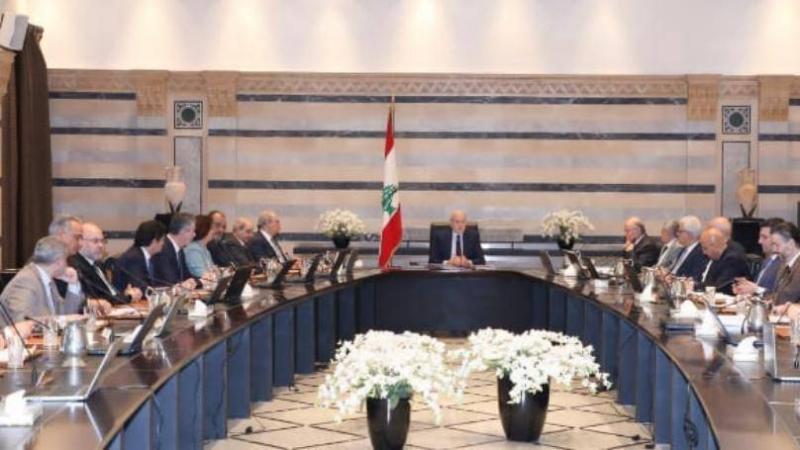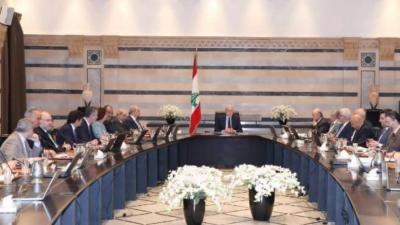Prime Minister Najib Mikati chaired a cabinet meeting this morning at the Grand Serail, attended by Deputy Prime Minister Saadeh Al-Shami, and ministers including Youth and Sports George Kallas, Industry George Bouchikian, Public Works and Transport Ali Hamieh, Labor Mustafa Bayram, Agriculture Abbas Al-Haj Hassan, Information Ziad Makari, Environment Nasser Yassin, Tourism Walid Nassar, Public Health Firas Al-Abyad, Education and Higher Education Abbas Halabi, Economy and Trade Amin Salam, Interior and Municipalities Bassam Mawlawi, Communications Johnny Al-Qaram, Finance Youssef Khalil, Culture Mohamed Awad Murtada, Administrative Development Najla Riachi, and General Director of the Presidency of the Republic Antoine Chaker, as well as Secretary-General of the Cabinet Mahmoud Makiyeh. Kamil Hayek, General Director of the Lebanese Electricity Company, and Board Member Tarek Abdullah also participated in part of the session.
At the end of the session, Prime Minister Mikati stated: "I want to start my speech with politics, and let everyone understand that when the Cabinet meets, it is not to engage in disputes or deepen the rift in Lebanese politics. We meet to serve the citizen in every sense of the word. We are not here to secure anything for one team against another but to be together. I am keen on the unity of the Cabinet that convened, and I would like to say that the atmosphere was very comfortable, and there was cooperation among us during the session. Due to our full cooperation, we had an extensive agenda, but all the ministers were in solidarity, and they expressed that if any minister wanted to withdraw from the session for any reason, it was as if we all withdrew. From here, we started on the agenda, the most important of which was the electricity issue. I reiterate that it is not permissible for some to try to draw us into other alignments and debates, especially if these discussions are sectarian or similar. I confirm that I, Najib Mikati, am a Sunni Muslim in my home, but when I am at the Grand Serail, I am a national man and deal with all segments of the country in a manner that serves the nation and the people whose suffering we know."
He added: "The issue of electricity today is doubly important regarding the need to increase supply hours. I believe that if we succeed in solving the electricity issue, which has not been fully resolved today but we have made a start in solving it, we would have addressed more than 50 percent of the problems that the Lebanese suffer from. What we reached today is the approval of a $62 million advance regarding the first shipment, with a condition we requested from the Minister of Energy that he negotiate with the supplying company on the basis that no penalties would be incurred by the Lebanese treasury but rather by the supplier itself. This advance was immediately approved, as was an amount of $54 million for maintenance because without maintenance, there will be no benefit from the fuel that will arrive, as we need to maintain and operate the Zahrani and Deir Ammar plants.
Other requested items totaling around $300 million remained pending, according to a decision by a ministerial committee headed by me and including the Deputy Prime Minister and ministers of energy, education, public works, interior, defense, justice, and culture. The committee will meet regularly to keep in touch with the Electricité du Liban on everything needed to keep this operation ongoing. In light of the periodic reports we will receive, and knowing whether network violations have lessened and if revenue collection is ongoing, other funds will be approved. If we notice negligence in this matter, we are not prepared to disburse funds that we know are futile to pay.
We have approved today the core amount of $62 million, which is the essential funding required; if we hadn’t approved this item, we would have reached the end of the week without any fuel, especially with delays in the arrival of oil from Iraq. We are compelled today to proceed with this funding, and the important thing is that the payment will be after six months and not immediately upon opening the credit."
He continued: "During the session, we had many objections and discussed all the topics, especially the reasons for bringing in the ships before opening the credit; this topic garnered extensive discussion. I would also like to note that at the beginning of the session, some ministers objected and demanded to study vital issues concerning citizens, including educational and health matters, issues related to waste, and importing wheat and flour, so we agreed to hold a session soon, either next week or the one after, to discuss all these urgent files needed by the citizen. We are all agreed on putting all urgent and critical matters for discussion and resolution in the Cabinet; we are not enthusiasts of problems and disputes but follow this matter responsibly.
In his opening remarks, Prime Minister Mikati stated: "The cabinet session convenes in its normal context because there are fundamental issues that need a cabinet meeting to be resolved, and this is something that is unfeasible outside the known constitutional frameworks or methods that were adopted during the war to manage the state’s matters amid the prevailing division."
He mentioned: "We are faced with a daily challenge to address urgent issues and people's demands that do not wait for anyone's political whims or bets. Today's session, like the previous one, is more than urgent; it is unfair and irresponsible to mislead the Lebanese about untrue matters and to manipulate their sectarian and partisan sentiments for goals that are no longer hidden from anyone."
He added: "The current government, from its constitutional position as a caretaker government, is not in a position to replace the president or to consider that the country can continue without a president. It is shameful to portray matters in a way that suggests that the government is responsible for prolonging the presidential vacuum and delaying the completion of this entitlement, which we reiterate should be completed as soon as possible as it is a mandatory entrance for the regular functioning of constitutional institutions and also a gateway for forming a fully empowered government according to constitutional rules."
He concluded: "I am not inclined to engage in fruitless debates or to be drawn into responding to what has been said about sectarian rhetoric and invoking fears and titles that exist only in the imaginations of some. The ministers represent all Lebanese, and it is disgraceful for anyone to doubt the nationality or belonging of any minister and their status and identity. Each minister has their position within their sect and their role within the nation. Today's session is a response to a national duty and a commitment to national and constitutional responsibility, moral and legal, to meet the urgent needs of citizens in electricity and to take proactive and precautionary steps to protect the food security of the Lebanese in terms of bread through securing the necessary funds for wheat, flour, and other life and health necessities that cannot tolerate delays or political grudges. These matters should not be cloaked in sectarian and factional pressures for narrow political ends."
He stated: "This session, the previous one, and any governmental action in the future will be in alignment with the logic of the constitution, preserving partnership and the covenant, and will not at all be a challenge or provocation to any party."
He emphasized: "From my position as prime minister, at this current and critical moment where Lebanon is struggling with crises that pose an existential risk to it, I will not heed the distorted voices coming from here and there. My responsibility, like that of all my fellow ministers, according to the logic of the constitution, is to feel the pain and needs of Lebanese citizens who are tired of disputes and incitement speeches aimed at personal ends in light of the danger threatening Lebanon."
He concluded: "The pinnacle of respect for the covenant, partnership, and the constitution is that everyone bears national responsibility. Hence, our constant call is to hasten dialogue and consensus to elect a president who can unite the Lebanese before it’s too late."




